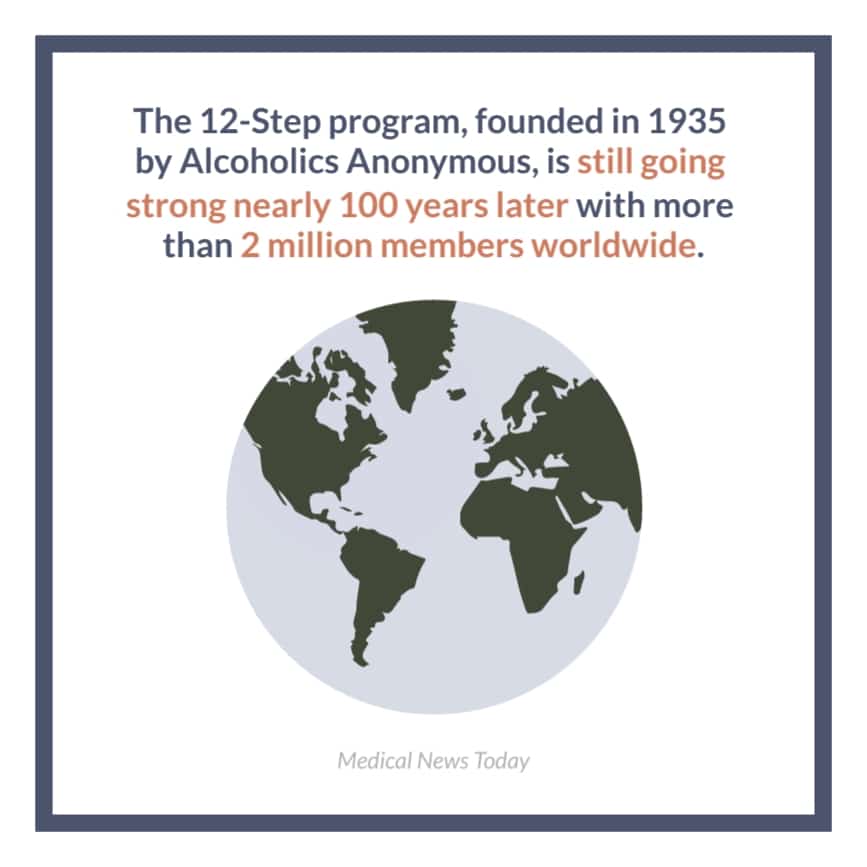By Christa Banister
Ever notice how what’s trending in the health and wellness industry seems to change as quickly as it does in fashion or technology?
One month, everyone is following keto for weight loss. The next month, it’s all about intermittent fasting. A few months later, it’s back to “clean” eating and carb restriction. And that’s not even factoring in the revolving-door conversation about whether coffee, eggs, and diet soda are harmful, or just fine.
In the world of recovery, however, there are a number of reasons why the 12-Step approach has stood the test of time and varying trends along the way. Whether used in conjunction with a residential or outpatient program or alone, for nearly 100 years, this proven method has helped those who struggle with addiction to not only get well, but stay well.
For nearly 100 years, this proven method has helped those who struggle with addiction to not only get well, but stay well.
The 12-Step program that’s probably the most familiar is Alcoholics Anonymous (AA). With more than 2 million members around the world, there are AA groups that gather regularly in 180 countries, according to research from Medical News Today. In the United States, there are more than 1.2 million members and counting.
AA was so successful that other programs launched with the same model. Along with Narcotics Anonymous (NA), 12-Step programs that emerged to address mental health conditions and potentially dysfunctional behaviors include:
- Debtors Anonymous
- Eating Disorders Anonymous
- Gamblers Anonymous
- Overeaters Anonymous
- Sex Addicts Anonymous
- Workaholics Anonymous
The Power of Connection
So, what exactly is it about the 12-Step approach that resonates with participants in such a universal way?
For starters, it’s not having to walk through the recovery process alone. Struggling with addiction can leave you feeling isolated. Maybe you can’t shake the shame, regret, or guilt about who you’ve hurt, or how much addiction has hampered your health, relationships, career prospects, and finances. Or the fact that you vowed to get clean but slipped up. Most likely, it’s a combination of the aforementioned realities.
Centering around the principal of universality, namely that no one is alone in the world, the 12-Step approach to addiction provides a safe space for actually letting go of shame and guilt. It’s a place to share thoughts, voice concerns, and feel heard and understood by people who resonate with these very struggles.

That sense of community fostered in recovery is vital. Data from the National Library of Medicine (NLM) shows that remaining substance-free and achieving other behavioral health milestones is bolstered with belonging. In addition to reducing the number of people in your life who misuse substances, it offers a social shift in hanging out with men and women who share a common goal.
Developing Strategies for Lifelong Recovery
A key part of the 12-Step approach to recovery is that focusing on mental health and sobriety isn’t simply a fad or a short-term endeavor. It’s a lifelong pursuit with the goal of strengthening your relationship with yourself, others, and a higher power greater than ourselves.
That’s one of many reasons that millions of people have found healing and happiness since the 12-Step approach was introduced. It’s a developmental process of admitting powerlessness over addiction, and making decisions like a mature adult: balancing self-centeredness with thinking of others, and making amends to everyone we’ve hurt along the way.
And by focusing on one step at a time, it makes a daunting, extremely vulnerable endeavor feel less so.
Not surprisingly, the more you open up and participate in the process, the more likely the 12-Step approach will yield lasting benefits.
Not surprisingly, the more you open up and participate in the process, the more likely the 12-Step approach will yield lasting benefits. When judging the effectiveness of the program, NLM research showed that the average length of abstinence among AA and NA members was longer than five years.
Even better outcomes were documented among those who:
- Began the program while in treatment
- Increased regularity and frequency of meeting attendance
- Shared personal stories and experiences during meetings
- Engaged in activities beyond regular participation, such as following up with other group members, or serving in some capacity at meetings
Do you or someone you love struggle with addiction or mental health challenges that are holding you back from living a healthy life where you and your relationships are thriving? Here at The Meadows, our proven 12-Step approach is guided by our caring team of experts who will help you address the underlying factors behind all addictive behaviors. To learn more about The Meadows and how to incorporate 12-Step principles into your life, don’t hesitate to reach out.



